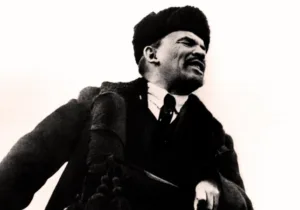Forty years ago, President Ronald Reagan shocked many in the West by labeling the Soviet Union an “evil empire” and the “focus of evil in the modern world.” Critics responded with scathing commentary. Historian Henry Steel Commager called the address “the worst presidential speech in American history” and New York Times columnist Anthony Lewis, labeled the speech “simplistic,” “sectarian,” “terribly dangerous,” and “primitive.” Writing in The Christian Science Monitor, Joseph Harsch claimed that Reagan’s message “leads logically to an arms race, to confrontation, to avoidance of negotiation, and would someday, in logic, point toward war.” In fact, Reagan’s words and policies led to important arms limitation agreements and the eventual end of the Cold War, with the collapse of the “evil empire” itself.
A close look at the speech can explain how the press so misunderstood the import of Reagan’s words and deeds. In the “evil empire” and other Soviet-era speeches, Reagan laid out the principles that would play a key role in winning the Cold War. Reagan’s strategy for confronting the Soviet Union was based on what distinguished historian John Lewis Gaddis called “the potency of ideas.” The starting point was his view that, in contrast with the multiple failures of the Soviet system, the democratic approach of the West was both morally superior and economically more productive. Thus, Reagan did not see détente as either ethically or pragmatically appropriate. Rather, Reagan famously argued that the only possible approach to “the Cold War is that we win and they lose,” but that this must be accomplished without risking war.
Reagan’s grand strategy was built around three fundamental principles. First, Reagan believed there was power in labeling the Soviet Union as evil and a failure, both to show the Soviet leaders that he understood their system and to provide hope for ordinary citizens of the Warsaw Pact. It was in the “evil empire” speech more than any other of his Cold War speeches that Reagan enacted this strategy. Reagan’s truth telling alarmed some because he refused to hide “reality behind the niceties of diplomacy.” His honesty was shocking, not because of any dispute over the veracity of his claims about about the evil of the Soviet Union, (even Anthony Lewis made clear he detested the Soviet system), but because it seemed impolitic. What Reagan understood, however, was that truth telling was a necessary first step both for building support for his policies and for convincing the Soviets that they could not win the Cold War. It was truth telling that gave his speeches what one of his speechwriters, Peter Robinson, labeled their “trumpetlike quality.”
The second principle in Reagan’s “grand strategy” was his belief that the only way to negotiate real arms reductions was to first build up American forces to persuade the Soviets that they had no alternative but to negotiate. His goal was to use the buildup (and rhetoric supporting it) to make it clear to the Soviets that they could not win an arms race, and in so doing persuade them to turn away from an aggressive foreign policy and show that real arms control was in their self-interest. Reagan explained this point in his autobiography, “I wanted to go to the negotiating table and end the madness of the MAD policy, but to do that, I knew America first had to upgrade its military capabilities so that we would be able to negotiate with the Soviets from a position of strength, not weakness.” The “evil empire” speech served a crucial function in this strategy by blunting the growing political power of the Nuclear Freeze movement in order to maintain the arms buildup. It was that buildup, he believed, that would allow negotiation from a position of strength. That is why he used the speech both to attack the Nuclear Freeze movement and to call for an eventual “50-percent cut in strategic ballistic missiles and the elimination of an entire class of land-based, intermediate range nuclear missiles.”
The arms buildup and the rhetoric defending it were both designed to persuade Soviet leaders that they had no hope of “winning” the Cold War and that their best option was to negotiate real arms reductions and reform their system. In the “evil empire” speech, Reagan asked the audience to “resist the attempts of those who would have you withhold your support for our efforts.” Such resistance to the freeze would aid the administration in its goal “to keep America strong and free, while we negotiate real and verifiable reductions in the world’s nuclear arsenals and one day, with God’s help, their total elimination.” In this passage from the speech, Reagan made clear his goal of eventual nuclear abolition.
Third, Reagan strongly defended principles of liberal democracy based in the premise that these ideas reflected universal ideals. Bearing in mind “the potency of ideas,” Reagan “sought to break the stalemate . . . by exploiting Soviet weaknesses and asserting western strength. His preferred weapon was public oratory.” In the “evil empire” speech, Reagan enacted this strategy when he said “the struggle now going on for the world will never be decided by bombs or rockets, by armies or military might” but rather in a battle of ideas, “a spiritual one; at root… a test of moral will and faith.” In that battle, Reagan believed that the United States would prevail because the nation’s ideas were morally, spiritually, and ideologically superior to those of the Soviet Union.
Forty years later, it seems clear that Reagan’s critics missed the real message of the “evil empire” speech and the importance of truth telling, especially when that truth telling violates what Reagan called the diplomatic “niceties.” The Soviet Union was an “evil empire,” and speaking that impolitic truth was essential to winning the war of ideas that would eventually lead to the end of the Cold War. The “trumpetlike” quality of Reagan’s message continues to have importance today as Vladimir Putin attempts to resurrect the Soviet empire.






 Live in the DC area? Sign-up for Providence's in-person events list!
Live in the DC area? Sign-up for Providence's in-person events list!